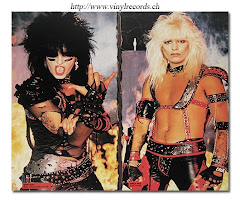Monday, September 28, 2009
Masculinity of Boyz in the Hood
It's clear from the very start of the movie that a man is only a man if he is capable of carrying the responsibilities of a family and providing for them. I believe Furious at one point tells his son that "any fool can make a child, but only a real man can raise one"... or something to that effect. Even Tre's mother acknowledges this view point simply by sending him off to live with his father, because, apparently, only his father can teach him how to be a real man. According to Furious, and by extension according to the movie, positive masculine roles center around knowledge, responsibility, and family values. Furious essentially trains his son by placing the weight of chores and other such tasks upon his shoulders so that he can learn how to be responsible, thus keeping his mind focused on important needs rather than having him gallivanting around the streets like his friend Doughboy. Further more, Furious is constantly warning him and lecturing him on the precautions one should take to prevent having a child when one is not ready. He speaks to him about sex and contraception in order to ensure these ideals into his son so that he won't have to shoulder the responsibility of a family until he is able to carry his own weight and support himself.
Of course, not all the positive masculine roles revolve around family. Tre's best friend, Ricky, takes a different path, one that involves a sort of american dream of sports and the success it brings. Because of Ricky's talent within football, his future seems bright and stable because it has a clear direct path, a path completely separate from that of his irresponsible brother. Ricky is somewhat the generic symbol of american culture and the success that things like sports or fame can bring and is thus shown as a positive route in direct opposition to the turbulent his brother chose. It's a direct juxtaposition of what is 'right' and what is 'wrong'.
In contrast, it's obvious that the negative masculine roles revolve around delinquency and criminal behavior. A lifestyle sorely lacking in responsibility and direction, and infused with overt sexual behavior and disregard for other human life. This in no way implies a carefree lifestyle, but instead, rather a careless one... one without regard for anything, even one's own self. Doughboy is the singular embodiment of all of these aspects within the film and it is clear that his life is not as acceptable as his brother's or Tre's. He's a criminal, one that is of no consequence and is completely disregarded in the grand scheme of life - especially the lives of his mother and his brother.
Obviously race factors into all of these depictions of masculinity. Sometimes in a subtle manner and sometimes extremely overt, but one major way that it plays a role is simply the viewpoint or the lens through which we are viewing all these depictions. It might not actually be so, but the way the movie depicts the life of african americans in south central LA makes their lifestyle, and perhaps their culture in general, to appear extremely aggressive and turbulent. The characters live in a neighborhood where people get shot at everyday and drugs are dealt around in the most overt of manners. Sure it may give the story a dynamic setting, but it also reflects upon the people being portrayed. It infuses their culture and lifestyle with this violent anti-social nature in the eyes of all it's viewers. In the case of masculinity it almost multiplies the aggressive nature of a man almost to the point of being hyperbolic and slightly unsettling.
Subscribe to:
Post Comments (Atom)


No comments:
Post a Comment
Note: Only a member of this blog may post a comment.